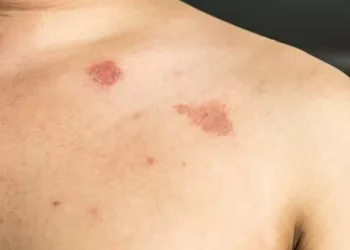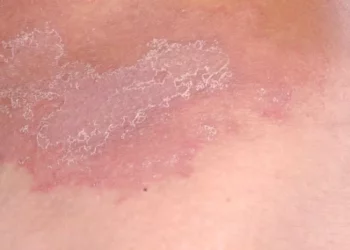Scalp ringworm, also known as tinea capitis, is a fungal infection that affects the scalp and hair shafts. It’s a highly contagious condition, primarily affecting children but also capable of spreading to adults. The infection is characterized by itchy, scaly patches on the scalp, and if left untreated, it can lead to hair loss and other complications. In this article, we will explore the causes, symptoms, and effective treatments for scalp ringworm, as well as preventive measures to avoid its recurrence.
Understanding Scalp Ringworm
Causes and Transmission
Scalp ringworm is caused by dermatophytes, a group of fungi that thrive in warm, moist environments. These fungi can be spread through direct contact with an infected person or animal, or indirectly through contaminated objects such as combs, hats, pillows, and towels. Sharing personal items or close physical contact increases the risk of transmission.
The primary species responsible for scalp ringworm include Trichophyton and Microsporum. These fungi invade the outer layer of the skin, hair follicles, and hair shafts, leading to the characteristic symptoms of the infection.
Symptoms
The symptoms of scalp ringworm can vary, but common signs include:
- Itchy Scalp: Persistent itching is often the first symptom.
- Scaly Patches: Red, scaly patches that may be inflamed or swollen.
- Hair Loss: Hair may break off near the scalp, leading to bald patches.
- Black Dots: Infected hairs may break off, leaving tiny black dots on the scalp.
- Kerion: Severe cases may result in a large, inflamed, pus-filled sore called a kerion, which can be mistaken for a bacterial infection.
Early diagnosis and treatment are crucial to prevent the spread of the infection and avoid permanent hair loss.
Diagnosing Scalp Ringworm
Diagnosing scalp ringworm typically involves a physical examination by a healthcare provider. They may use a special lamp called a Wood’s lamp to illuminate the infected areas, as some fungi fluoresce under ultraviolet light. Additionally, a sample of hair or skin scraping may be taken for microscopic examination or fungal culture to confirm the diagnosis.
Treatment Options
Treating scalp ringworm requires a combination of antifungal medications, good hygiene practices, and sometimes adjunctive therapies to manage symptoms and prevent recurrence.
Antifungal Medications
Oral Antifungal Medications: Because scalp ringworm affects the hair shafts, topical treatments alone are often insufficient. Oral antifungal medications are typically prescribed for several weeks to ensure the infection is fully eradicated. Commonly prescribed oral antifungals include:
- Griseofulvin: One of the most commonly used medications for scalp ringworm. It is usually taken for 6-8 weeks.
- Terbinafine: Another effective oral antifungal, often prescribed for 4-6 weeks.
- Itraconazole: Sometimes used for resistant cases or when other medications are not suitable.
- Fluconazole: Another alternative, especially for patients who cannot tolerate other treatments.
- Topical Antifungal Shampoos: In addition to oral medications, antifungal shampoos can help reduce the spread of the infection. These shampoos typically contain ketoconazole or selenium sulfide and should be used a few times a week as directed by a healthcare provider.
Managing Symptoms
To alleviate symptoms and prevent secondary infections, the following measures can be helpful:
- Anti-Itch Treatments: Over-the-counter antihistamines or corticosteroid creams can help reduce itching and inflammation.
- Gentle Hair Care: Avoid harsh hair treatments and use gentle, hypoallergenic shampoos and conditioners.
- Warm Compresses: Applying warm, moist compresses can help relieve discomfort and reduce swelling.
Preventing the Spread and Recurrence
Preventing the spread of scalp ringworm is essential to protect others and avoid reinfection. Here are some preventive measures:
Personal Hygiene
- Avoid Sharing Personal Items: Do not share combs, brushes, hats, towels, or bedding with others.
- Regular Hair Washing: Wash hair regularly with antifungal shampoo if recommended by a healthcare provider.
- Clean and Disinfect: Regularly clean and disinfect personal items and household surfaces that may be contaminated.
Environmental Measures
- Pet Care: Pets can be carriers of ringworm. Regularly check pets for signs of fungal infections and consult a veterinarian if necessary.
- School and Daycare Policies: Ensure that schools and daycares have policies in place for managing and preventing the spread of ringworm among children.
- Frequent Cleaning: Clean and disinfect shared areas, such as gyms, locker rooms, and play areas, to reduce the risk of fungal transmission.
SEE ALSO: The 6 Best Shampoo for Ringworm
Natural and Home Remedies
While medical treatment is essential, some natural and home remedies can support recovery and relieve symptoms. However, these should not replace prescribed medications.
- Tea Tree Oil: Known for its antifungal properties, tea tree oil can be diluted with a carrier oil and applied to the affected areas. Perform a patch test first to ensure there is no allergic reaction.
- Apple Cider Vinegar: Diluted apple cider vinegar may help reduce fungal growth and soothe the scalp. Apply with a cotton ball and rinse after 15-20 minutes.
- Coconut Oil: Coconut oil has antifungal properties and can help moisturize the scalp. Apply it to the scalp and leave it on overnight.
When to See a Doctor
Consult a healthcare provider if you suspect scalp ringworm, especially if you notice persistent itching, scaly patches, or hair loss. Early treatment is crucial to prevent complications and the spread of the infection. Additionally, seek medical advice if:
- Symptoms Worsen: If symptoms worsen despite treatment, consult a healthcare provider.
- Severe Inflammation: If there is significant swelling, pain, or pus, medical intervention may be necessary.
- Recurring Infections: If scalp ringworm recurs, further evaluation and treatment adjustments may be needed.
Conclusion
Scalp ringworm is a common but treatable condition. With proper diagnosis, timely treatment, and preventive measures, you can effectively manage the infection and prevent its recurrence. Oral antifungal medications, good hygiene practices, and supportive home remedies play crucial roles in the recovery process. If you suspect scalp ringworm, consult a healthcare provider for appropriate diagnosis and treatment to ensure a swift and complete recovery.
Related Topics:
























